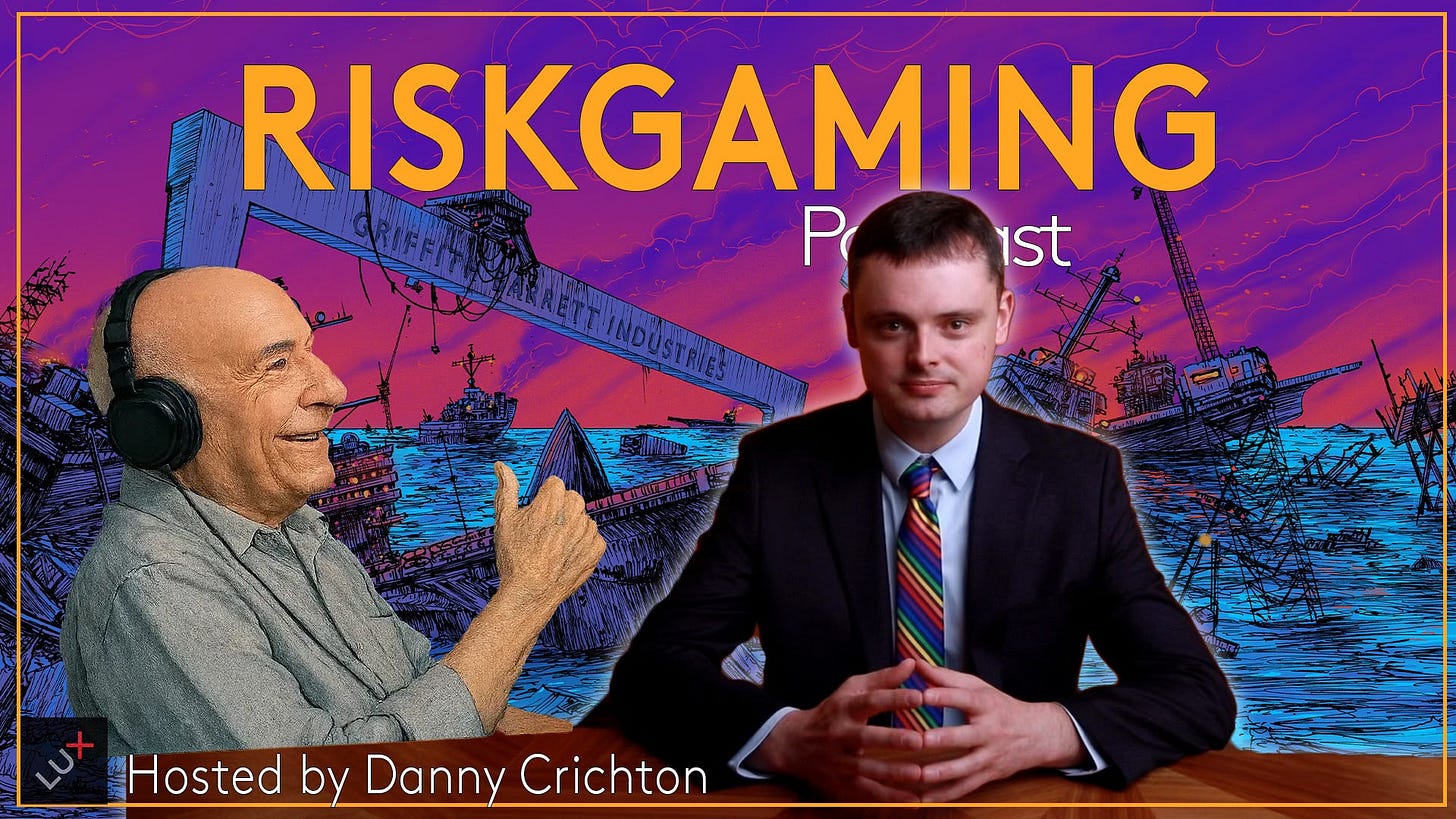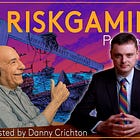Kahneman, Duke and Mauboussin on optimism bias and self-confidence
Part 2: Hot hands, overconfidence and group dynamics
Last week, we recirculated one of my favorite interviews in the entire Riskgaming podcast archive, our May 2022 lunch debate on risk, bias and decision-making with Nobel Prize winner Danny Kahneman, World Series of Poker champion and author of How to Decide and Thinking in Bets Annie Duke, legendary investment strategist Michael Mauboussin of Morgan Stanley’s Counterpoint Global, and our own founding managing partner Josh Wolfe.
In last week’s talk, the group discussed the value of pre-mortems, the possibility or impossibility of humans changing their minds and dissonance reduction. Now we turn to the second half of their conversation as they look at the illusions and amplifications of optimism, overconfidence and whether hot hands exist in real life.
This Q&A has been edited for length and clarity.
For more of the conversation, please subscribe to the Riskgaming podcast.
Michael Mauboussin:
Who would ever start a new company? Who would ever launch a product? If you knew the base rates, it’s too sobering. So that’s the big question: How can optimism and base rates happily live in the same world?
Josh Wolfe:
It must have been 20 years ago, but in two different conversations in the course of two days, I heard something that really stuck with me: Experience is overrated.
I was like, “What do you mean? You're supposed to go and get experience, you’re supposed to learn.” But when you study all these great people — you look at Bill Gates or Mark Zuckerberg — they had never before done the thing that they were going to do.
My answer to you on the base rate thing is, I would posit, frequency versus magnitude. The base rates might be a very high probability of failure in any of these things. Elon Musk was extremely improbable. Zuckerberg was extremely improbable. Gates was. But the magnitude of the success they achieved begat the copycats.
And then it brings in your question of overconfidence. Stanley Druckenmiller had this great quote when he was an early investor with us. He said, I'm giving you money for the same reason they gave me money, and let me run the desk at 27. And it's the same reason they put 19 year olds on the front line of war: they don't know any better than to charge full speed ahead.
So that increases the sample size of people who are going out there to do the improbable. And for the ones who are lucky or right, or both, the magnitude of their success is what becomes the proof for other people to try to gamble and replicate it.
Daniel Kahneman:
I think there is a big difference between the prospective and looking back. When you look back at great successes, you find people who defy the base rates, who took unreasonable bets. All of the really successful people are major surprises. And they are major surprises because they seem to have denied all the obvious things. When you look prospectively, though, they did have negative expected value when they were doing it.
Annie Duke:
I don't want to confuse the base rate for an individual with the base rate for the portfolio. I don't think any of those people defied the base rates if you're thinking about it as a portfolio problem. Think about humanity as a portfolio. If you try to walk from Africa to Europe on an individual basis, you're probably dead. But from humanity’s standpoint, that is a positive expected value. And I think that’s also true in terms of innovation and entrepreneurship.
The question is, given that something is good for humanity as a whole versus the individual doing it, is optimism what allows the individual to try? And I think the answer to that is yes. But there's a separate question that should not be confused with the first, which is whether optimism makes it more likely that the person will succeed. And that doesn't seem to be true.
Don Moore made a logical point: If you can jump seven feet and you're standing on a crevasse that's 7.1 feet, optimism might get you that extra 0.1. But it's not going to get you 25. He's actually done experiments. What he finds is that people have a very strong belief that people who are more optimistic will be more likely to succeed at a task. That's a very deeply held human belief. But as with many deeply held human beliefs, it turns out not to be true.
Daniel Kahneman:
There is a very big difference between the group and the individual. As an individual, there’s a negligible effect of optimism. In a group, it is very big.
Annie Duke:
Right, because you basically get to replicate that extra 1% across the group, and it compounds.
Josh Wolfe:
I was visualizing something when you gave the example of the person jumping across the crevasse. Let's say they could jump seven feet. But it was seven feet on average. Sometimes it might be six, sometimes eight. The optimist might just underweight the negative consequences. And so they might have gotten lucky. It wasn't that the optimism actually gave them any physical strength or vaulted them that extra foot, it's just that they might have plunged in the first place. But then they got lucky.
Annie Duke:
Let me give you a problem to ponder. So think of people doing anagrams, and the test is how many you are going to be able to do. When asked what's your prediction on how well you're going to do, people are horribly calibrated. They'll get like four on average, but the average person guesses they'll get nine. If you do a pre-parade, by the way, they guess they'll get 12.
Now, what that means is that they're more likely to maybe start an anagraming company. So that's great, but they're going to be very poorly calibrated about it. So when we're talking about things like pre-mortems, the idea is to get you to be better calibrated.
Now, is it good, across the portfolio, that people are willing to start an anagraming company? Of course, across the portfolio. For the individual? Having the willingness to take the risk, I think is amazing. Over optimism, I don't think, is necessarily amazing.
Josh Wolfe:
Something feels different about the infectious amplification of optimism in a group. You think about soccer hooligans, you think about armies, you think about the scenes in movies with galvanizing speeches from the coach. There's something about that amplification, which feels visceral. I mean, your hormones are going, you're flooded with whatever neurotransmitters and biochemicals in your body, you're amped up.
And it's this amplification of optimism and confidence, which I think skews the odds differently than the increased optimism of an individual. There, my guess is that confidence compelled them to do the thing, but luck played a role. Whereas I could see that there's something in the group dynamic that actually skews the odds.
Annie Duke:
I mean. I don’t know. The coach is telling them all week how the other team's going to eat their lunch. At halftime, getting them physiologically amped up is probably really helpful. But the whole week before that is just pessimism.
Like, are we saying that it's a good thing to be miscalibrated? I just cannot believe that you would be able to demonstrate that it is good to encourage people to miscalibrate. It is different saying there are lots of different types of people in the world, and there are people who will take no risk and people who will take lots of risk. And we as a species are so lucky that there’s that spread.
Daniel Kahneman:
It seems to me that optimism is good in execution. It's not good in planning. In execution, especially with groups, then it's clear that believing that you can do it means that you persevere more, it means that you're more resilient to failure. All the good things happen. The odds versus risk taking — I'm not sure that distinction is so profound. My sense is that it's very good for somebody who is going to take a risk to believe that it will work. But if we have a lot of diversity in optimism, would that be very different? It wouldn't be. So it's still consistent with the theory that, basically, when people take risks, it is because they don't know the odds.
Josh Wolfe:
We were talking to Sebastian Mallaby on earlier podcast episode. He wrote a book on venture capital, The Power Law. He has this wonderful line that venture capital is an industry that is there to manufacture confidence.
Annie Duke:
I will say that I think that people take it too far. Encouraging overconfidence, encouraging continuing on no matter what — there's a huge cost to it. For example, say it's very clear that a venture is failing. So let's say that the venture still has 6 million of 40 million they've raised in the bank, but the writing's on the wall that this thing is not going to work. From the founder’s perspective, they think they've just got to keep going until the end. Returning capital would be a disaster.
But if they did just return that 6 million, the venture capitalist could now redistribute it — sometimes back to you and another venture that will work. And I think people aren't thinking about the knock-on effects: you have employees who are taking less cash comp in exchange for equity that everybody has figured out is not worth anything. And you've trapped them.
Josh Wolfe:
Well the rational thing, and maybe the right thing, is to give back the money. But people don't do that. We have an instance right now with one of our companies, where the partner at Lux has been saying for quarters, “you’ve got to cut your losses.” But the CEO is a true believer — or is bluffing and not signaling his doubt — and is taking pedal to the metal to the very precipice.
Annie Duke:
There's this counterfactual problem. We just hate not knowing, and the only way for you to know for sure how it would have turned out is to keep going. So there's the siren song of certainty causing you to go past the point at which you ought to be stopping. And I think a lot of it comes from our own issues about sunk costs, our own issues about uncertainty, these counterfactual problems, our identity, consistency, endowment — all this stuff that's kind of driving us.
In my book coming out in the fall [Editor’s Note: this was Quit], I talk about Ron Conway, who was really well known for getting founders to return capital. It comes back to the idea from the last episode of thinking ahead and being specific. So what Ron does is he says, “I agree with you. I think you're going to turn it around. Now, if we look over the next six weeks, what are the benchmarks that you're going to hit that would tell us that you have successfully done so?” And then he makes an agreement with them that if they don't hit those benchmarks, that they'll return the capital. Now, do they always do that? No. Do they do it more than they otherwise would have? Yes.
Josh Wolfe:
Let’s talk about this in the context of this current moment. You've got WeWork, Uber, Theranos. All have movies about them. There’s a scene from WeWork, where the guy says, “Who wins in a fight? The big guy, or the tough guy, the strong guy, or the crazy guy?” He’s at this precipice, he's gonna fail, they're running out of money, and he decides he's gotta go crazy. And he starts telling people, we're not going to be a $50 billion business, we're going to be a trillion dollar business. And everybody looks at him like he’s crazy. But then they calculate that if he's this crazy, maybe he'll actually pull it off. And we talked about Elon. At so many different points, he’ll say “we were facing death.” And he bluffed, and he won. And it only encouraged him to bluff bigger and bigger and bigger.
Annie Duke:
Well, except I just want to note: survivorship bias. For every person who bluffs in that situation, and it works, there's an insane number of people where it completely failed.
You know, I remember my brother saying something to me in poker: You'll see people who, for a six-month-period, will just do amazingly well. If asked whether they are really amazing players, he’d always say, “I don't know. I have to see what happens over the next year.” So the idea is, there's going to be people doing all sorts of nutty stuff. Some of them are going to shake out and have some success, and then you watch those people and you see if it's repeatable for them.
Josh Wolfe:
Michael's old colleague, Bill Miller, used to say “yes, there’s reversion to the mean, but means can move.” Poker hot hands, academia hot hands, venture capital hot hands — in both academia and in venture capital, there is a brand value that can accrue. You might get better collaborators, you might have more resources. So there's sort of a positive feedback effect. In poker and in basketball there have been so many studies on the “hot hand” and whether it exists or not. What’s the current thinking?
Daniel Kahneman:
It exists.
Josh Wolfe:
In what domains?
Daniel Kahneman:
In domains where it was said that it doesn't.
Annie Duke:
Baseball, batting average.
Daniel Kahneman:
Now, what is absolutely true is that there is less of a hot hand than people think.
Josh Wolfe:
Michael?
Michael Mauboussin:
I agree with all that, of course. But I think the evidence is that it is just not a significant thing. It exists statistically, but it's not significant.
Daniel Kahneman:
No, it is significant.
Michael Mauboussin:
Significant in terms of statistically significant? Or meaningful?
Daniel Kahneman:
Meaningful.
Annie Duke:
I can tell you how it works in poker.
So in poker, it's really bad for you, as a player, if you have to win by having the best hand. And you can see why that would be. We're all going to have the best hand an equal number of times. What's really good for you in poker is if you can cause people to fold before you ever find out whether you had the best hand or not.
Now, obviously, there are other things that have to do with it like what hands you select, whether you fold at the right times compared to somebody else. But the one thing that really matters is whether I can bluff you.
So what happens when I've won a bunch of hands in a row? The table now perceives me as someone who is on a rush. You may think that the fact that I've won in the past will predict that I will win in the future. Now, statistically, absent human behavior, that's not true.
Josh Wolfe:
Every hand should be independent.
Annie Duke:
It is independent, absent human behavior. But luckily, you're playing with humans at the table. And so what happens is, when I come in betting, you're now just less likely to want to play against me.
Josh Wolfe:
So the perception of the presence of a hot hand can actually lead to the presence of the hot hand.
Annie Duke:
Correct. So if there were no human behavior, it wouldn't help me that I'd won a bunch of hands in a row. Because when I bluffed, you’d just be an algorithm that would say, here's the probability. But that's not how human beings are. The hot hand allows you to lower the quality of the hand that you're playing because it increases the chances that you’ll be able to bluff somebody. And you can see how that sort of becomes circular.
Josh Wolfe:
I think we're gonna have to wrap. You know, whenever I post pictures of us at lunch people say, “if I could only be a fly on the wall when this crew gets together.” Now we get to have some flies on the wall.






